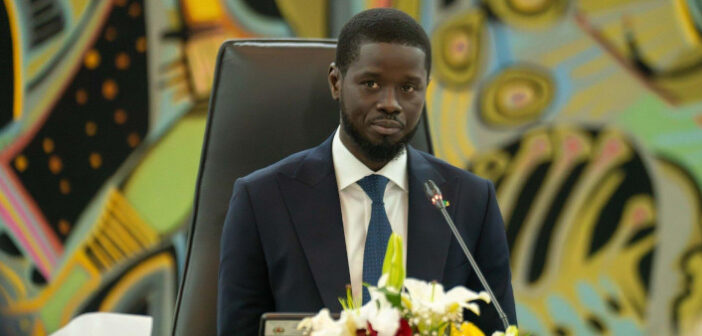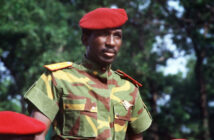Bassirou Diomaye Faye, Senegal’s newly elected president, has ushered in a new era for the West African nation. At 44 years old, he is Africa’s youngest democratically elected leader, and his victory represents a profound desire for change among the Senegalese people, particularly the youth.
Faye’s rise to power has been remarkable. He was imprisoned for over 11 months by the previous administration before being released just 10 days prior to the March 24 election. Despite this, he won a decisive victory with 54.3% of the vote.
Bassirou Diomaye Faye, faces a daunting array of economic and political challenges as he takes office, but also has opportunities to steer the country in a new direction. Faye, a former tax inspector, emerged victorious in a surprise first-round election win. He campaigned on a platform of fighting corruption, renegotiating oil and gas contracts, and introducing economic reforms to boost job creation and reduce poverty.
Reclaiming Economic Sovereignty
A central pillar of Faye’s agenda is the pursuit of economic sovereignty for Senegal. He has vowed to renegotiate contracts with foreign operators in the oil, gas, and fishing sectors to secure more favorable terms for the country. This stance reflects his broader goal of reducing Senegal’s economic dependence on external powers and asserting greater control over its natural resources.
Faye has also expressed a desire to leave the CFA franc, a colonial-era currency used by several West African nations, and invest more heavily in agriculture to achieve food self-sufficiency. These moves are aimed at bolstering Senegal’s economic independence and reducing its reliance on imports.
Challenges and Opportunities
While Faye’s ambitious agenda has raised concerns among some investors and financial experts, his democratic victory and commitment to transparency have also sparked cautious optimism. The price of Senegal’s bonds due in 2048 rose on the day following the election, suggesting growing confidence in the country’s economic outlook under Faye’s leadership.
However, Faye faces significant challenges, including a lack of a parliamentary majority and the need to create jobs for Senegal’s rapidly growing youth population. His ability to navigate these obstacles and deliver on his promises will shape the trajectory of his presidency and Senegal’s future.
Internationally, Faye has called for the reintegration of Burkina Faso, Mali, and Niger into the Economic Community of West African States (ECOWAS), highlighting his commitment to regional cooperation and stability. This stance presents an opportunity for Western nations to engage with Senegal on issues of African integration and foster more equitable partnerships that promote development and stability in the region.
As Senegal embarks on this transformative journey under Faye’s leadership, the international community has a chance to reshape its alliances and embrace a new era of cooperation with the West African nation. By meeting Faye’s administration halfway and supporting his pursuit of economic sovereignty, the West can contribute to shared prosperity and stability in the region.
Economic Challenges
Faye inherits an economy that has seen steady growth under outgoing president Macky Sall, averaging nearly 5% annually. However, this growth has failed to significantly reduce poverty, with about half of Senegal’s 17 million people still living in poverty according to the UN. Youth unemployment is a major issue, with almost a third of young people jobless and many risking dangerous journeys to Europe in search of work.
Faye has vowed to renegotiate Senegal’s oil and gas contracts with foreign companies, which he says will prevent the country from falling into “economic enslavement”. He has also proposed introducing a new national currency to replace the CFA franc, although he has since clarified he will first seek reform within the ECOWAS regional bloc.
Political Challenges
Politically, Faye faces a divided parliament, as his opposition party La Coalition Diomaye Président does not have a majority. He may call snap local elections to try to gain more support[3]. Faye also inherits a tense political climate, with protests and violence shaking Senegal’s reputation as a stable democracy in recent years.
Rights groups say dozens were killed in protests over the past two years, while around 1,000 people were jailed. Faye himself was imprisoned on charges of “incitement to insurrection” before being unexpectedly released just weeks before the election.
Opportunities
Despite the challenges, Faye’s victory also presents opportunities for Senegal. His election has been seen as a stress test for Senegal’s institutions, which have remained strong. Faye’s victory and the role of the Constitutional Court in ordering elections to be held on time have also broadened democratic space in the country after a period of restrictions under Sall.
Faye’s anti-corruption agenda and promises to stop misappropriation of government funds have also been welcomed by some investors. His victory has been met with a positive initial market reaction, with one Dakar-based investment professional saying “the economic future is bright”.
In his inauguration speech, Faye vowed to fight corruption and reclaim Senegal’s economic sovereignty. If he can deliver on his promises of reform and job creation, he has the potential to reshape Senegal’s economy and politics. However, he faces a steep learning curve, having never held public office before. The coming months will be crucial in determining whether Faye can navigate Senegal’s challenges and capitalize on the opportunities presented by his surprise victory.




